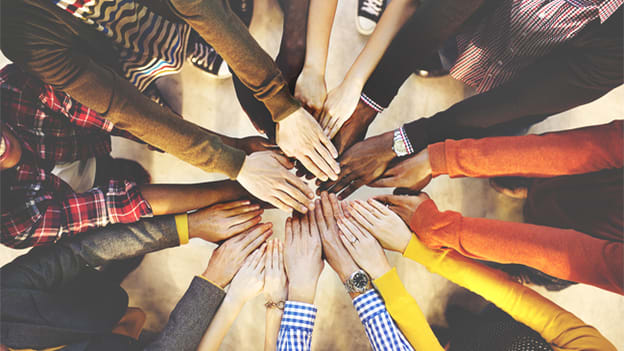Overcoming cultural tokenism: How can workplaces become more sensitive and inclusive?

Organisations that are driven to see real DEI outcomes need to develop a clear action-oriented strategy to steer away from tokenistic efforts. One of the critical touch points when it comes to this has a lot to do with cultural identities among others. While HR leaders may engage in better hiring practices with the intention to meet diversity targets, setting such goals has to do with a lot more than succumbing to numbers. Because when the talk is largely about numbers and percentages in building a diversity driven employer brand, we fail to spot a number of loopholes that continue to remain in the system at large and in the workplace culture.
When your workplace becomes one of the primary contexts where you as leaders, as colleagues show up face-to-face with a diverse range of voices, there is no better opportunity to show up as an ally and advocate for sustainable change beyond the usual rhetoric.
As Sonya Barlow, Founder, LMF Network said, “DEI can’t be a one box tick shop, it has to be bespoke, specific and ongoing, embedded into the organisation like any function.”
Practising diversity with the intention to ‘culture-add’ rather than ‘culture-fit’:
In an interaction with People Matters, Rose Colledge, Founder & Client Partner, PACT, said, “Leaders need to focus on building a company culture that everyone can sign up to and feel part of without losing their unique sense of identity. This is where company values can be more than just words but guide behaviours and every decision the company makes. Sensitivity and empathy can be built by better understanding more about the rich cultural tapestry that defines humankind and by dispelling some of the myths and misperceptions that drive the fear and intolerance of difference.”
Culture becomes the key entry when it comes to any and all diversity initiatives being spearheaded by the company and it requires active participation of leadership, especially C-Suite every step of the way. Colledge also suggests the creation of ethnically diverse advisory teams to identify ongoing company practices and policies that might not be culturally sensitive. The need is to definitively widen the lens when it comes to reviewing and revamping policies catering to D,E&I. Simultaneously, there must be greater investment in programs, resources and opportunities that provide access to mentorship and leadership development so that underrepresented communities can become leaders in their own right.
There is also the need for tough and uncomfortable conversations at the workplace. As pointed out by Ana Marfil, Senior Director, Global Diversity & Inclusion, TaskUs, “We all share a common humanity but our culture, upbringing, and circumstances shape how we experience things. As has been repeatedly said the past two years, we may be experiencing the same storm but we are not on the same boat. Not shying away from difficult conversations can provide leaders insight on how to support their people.” She further highlights the importance of involving minority communities every step of the way when it comes to implementing D,E&I strategies.
“No matter how earnest our intentions are, the lived experiences of people from minority groups remain the best way to do things right,” added Marfil.
The urgency of grounded, sustainable allyship at the workplace:
For the HR function to become a true ally, all aspects affecting diversity, from recruitment to pay scale to career mobility and financial wellness benefits need to be regularly looked into. Equally important is the creation of strong, sustainable professional networks at the workplace that makes your employees feel included and that they are receiving fair treatment.
Barlow talks about the necessity of “allyship training” at the workplace to give employees the knowledge and tools that will enable them to detect discriminatory practices.. She emphasised, “Such training will enable colleagues to provide supportive, safe and inclusive environments where all employees – no matter how they choose to express their faith – feel like they belong. The provision of some basic religious awareness training is an important way of combating harmful prejudices, unconscious biases and discriminatory practices. With culturally diverse populations also come socio economic and traditional nuances which still are not considered or recognised by companies today, and so it’s important that each individual invests in their own education and training on these topics, not placing the onus on those diverse but enabling them to share their experiences.”
Barlow clearly pointed out, “Dont expect the work of diversity and inclusion to be done by the person of colour, women, muslim or disabled or lesbian because they identify as the other and as many. Their intersectionality is a strength not a tokenistic attribute to be taken lightly.”
Becoming an ally means to show up in thoughtful and sustained ways to effect systemic change, to actively take part advancing DEI efforts by unlearning biases.
In order to truly beat cultural tokenism, organisations and leadership have to make space for and affirm the marginalised histories and voices time and again. It’s a work in progress but recognising where the loopholes may arise and making concerted efforts is bound to create a difference. As Alexander Reisch, Managing Director, IPM India Wholesale Trading Private Limited said, “For DEI to be truly imbibed within workplace culture, organisations need to take stronger steps to ensure continued feedback, listening, and dialogue with employees to ensure they are being heard, and appropriate steps are taken to address their concerns to bring positive change.”
















